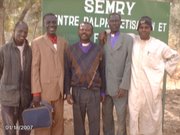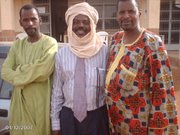The starting point of Christian missions is the New Testament church. The details of this new missionary outreach is contained in the Book of Acts, where the Apostles Paul stands out above all others, while Peter, Barnabas, Silas, John Mark, Philip, Apollos, and others also play very important roles.
Apart from Scripture, little is known of these first generation Christians, except for accounts that have been passed along through oral tradition, some of which declared that Jesus' own disciples carried the gospel abroad. Matthew is said to have gone to Ethiopia, Andrew to Scythia, Bartholomew to Arabia and India, and Thomas also to India.
The most plausible of these early traditions seems to be the one surrounding the apostle Thomas. As the story goes, Thomas disregarded the Lord's call for him to take the gospel to the East. He paid for it dearly by being carried off as a slave to India, where he was placed in charge of building a palace for King Gundaphorus. The tradition continues that while under the king's service Thomas spent his time spreading the gospel rather than building the palace an offence that quickly brought him a prison term.
In the end Thomas had the opportunity to share his faith with the king, who then baptized. A group of “Thomas Christians” in southwest India still worships in an ancient church said to be found by Thomas, and archaeological digs have now established that there actually was a King Gundaphorus who reigned in India during the first century. Apostle Paul undoubtedly ranks as the greatest missionary of the early church.
He, in the words of Ruth Tucker, “the greatest missionary of all times a man who conducted an extraordinary ministry of establishing Christianity on a grassroots level that insured its growth and stability in the centuries that followed”. She added: “From a strictly human standpoint, however, Paul is a less awesome figure than some adulatory devotees would have him be. In many ways he was a very ordinary man facing ordinary problems that have confronted missionaries ever since”.
Paul was on his way to Damascus to persecute the church when he was suddenly and miraculously converted. From this point on he became first-century Christianity's most energetic evangelist. His missionary journeys took him to cities throughout the Mediterranean world, where he effectively established indigenous churches.
Our concern here is not that of Paul's methodology but the price he paid to enthrone Jesus as Lord over the places he worked. Beside imprisonments and floggings, Paul endured almost every type of persecution and hardship that has ever been meted out. In 2 Corinthians 11:25-28 Paul wrote “Three times I was beaten with rods, once I was stoned, three times I was shipwrecked, I spent a night and a day in the open sea, I have been constantly on the move. I have been in danger from my countrymen, in danger from Gentiles, in danger from false brothers. I have laboured and toiled and have often gone without sleep; I have known hunger and thirst and have often gone without food; I have been cold and naked. Besides everything else, I face daily the pressure of my concern for all the churches”.
If that was not enough, Paul also suffered rejection, not only by the disciples who accepted him only after Barnabas came to his defence, but also by the Jewish leaders with whom he had once been associated. He must have also endured loneliness without the intimate ties of a wife and family. Paul finally met a violent end. According to tradition, he was martyred along with Peter and many other Christians during the odious persecution under Emperor Nero in A.D. 64. Below are catalogues of others.
McKay of Uganda and His Team Many more persons paid dearly to enforce the Lordship of Jesus over nations as the devil could not afford to fold his hands and allow his kingdom to depopulate. One of such persons is McKay of Uganda. His words: “I want to remind the committee that within six months they will probably hear that one of us is dead. One of us at least it may be I will surely fall before that.
But what I want to say is this: When the news comes, do not be cast down, but send someone else immediately to fill the vacant place.” That prediction was literally fulfilled. One by one the members of McKay's party either died of fever or were murdered by the natives, until, before long, he alone was left.
Allan Gardiner
While Ajayi Crowther was leading 150 missionaries who arrived Nigeria to the heart of Niger to commence pioneering work, 48 of them died. They died of mosquito bite. They died before setting their eyes on the ones they love so much and left their home countries to show them the love of Christ.
For Allan Gardiner, it was a different story. He and his brave companion caught the vision to the Indians. They entered the land but without a single convert, they starved to death. They did not die in vain. The blood of the Martyrs soon became seed of the church. A glorious harvest followed. This was the way he faced it: “My prayer is, that the Lord my God may be glorified in me whatever it may be, by life or death, and that He will, should we fall, vouchsafe to raise up, and send forth other labourers into this harvest, that His Name may be magnified, and His Kingdom enlarged, in the salvation of multitudes from among the inhabitants of this pagan land.”
As he neared the end, Gardiner, in spite of his awful predicament, wrote as follows: “Blessed be my Heavenly Father for many mercies I enjoy: a comfortable bed, no pain or even cravings of hunger, though excessively weak, scarcely able to turn in my bed, I am, by His abounding grace, kept a perfect peace, refreshed with a sense of my Saviour's love and an assurance that all is wisely and mercifully appointed.”
Finally, on lonely, hostile Patagonia, the last survivor passed to his reward. And thus the scene is pictured by Jesse Page as cited by Smith: “All was still now on that shore, and, in sight of the sky and the sea, the unburied martyrs lay. No slow and painful footsteps on the shingle now, no reverent words of praise and trust whispered by the faint breath of dying men. God had sent His messenger to stay the suffering of the saints, and they rested in peace. 'So, He giveth His beloved sleep.'” over the grave, and slowly the mourners returned to the ship. And once more the tide rose and fell on that desolate shore, and the sea-birds mingled their cries with the sobbing of the wind. The dirge of many waters sounded by the grave, while the snow, falling noiselessly, covered with its mantle of white the place where the saints slept.”
David Brainerd, CT Studd, William Carey Roland Bingham and Others
David Brainerd had this to say: “Here I am, Lord, send me: send me to the ends of the earth; send me to the rough, the savage pagans of the wilderness; send me from all that is called comfort in earth, or earthly comfort: send me to death itself, if it be but in Thy service and to promote Thy Kingdom.”
In C.T. Studd's words: “If Jesus Christ be God and died for me, then no sacrifice can be too great for me to make for Him.” The father of modern missions, William Carey did not escape paying hard prices for obeying God's call for missions. When he did go, he was burdened with two unsympathetic women, his wife and her sister, four helpless children, and a colleague who was an eccentric, and hopelessly in debt.
In addition, he was completely misunderstood by the Society that sent him out, slandered by his enemies, and persecuted by the natives whom he had come to win. His life reads like a book of fiction. Oswald J Smith observed: “today, missionaries get home on furlough every few years. But not so the pioneers. Some of them never saw the homeland again for periods of fifteen or even twenty years; some only once or twice in a lifetime.
Many of them went back never to return. Like David Livingstone and the martyred James Chalmers, they died at their post”. It would be hard to read the life of that lonely, bereaved figure, James Gilmour of Mongolia, and not realize something of the suffering through which he passed. But of all those whose lives I have studied, no one has touched my heart like Roland Bingham of the Sudan Interior Missions.
What Bingham and his team suffered, no tongue can tell. Death of colleagues, discouragement from other Christian bodies, demonic attacks, many years of labour without any fruit to show for it, etc. Such anguish is beyond the power of human words to describe.
How vividly Ruth Tucker portrays it in her soul-stirring book, From Jerusalem to Irian Jaya: “This third attempt, made in 1901, was successful, resulting in the first SIM station in Africa, located at Patigi, some five hundred miles up the Niger River. But with each step forward there were two steps backward, and within two years only one of the original party of four remained. One had died and two were sent home physically debilitated, never to return. Though hanging on “only by a toehold at first,” with only a few converts made during the first ten years at Patigi, the SIM gradually spread out to new stations and became firmly grounded in the desolate region.”
The Three Freds Somewhere in the great dread forests of Brazil lies all that is mortal of three brave pioneers for the Kingdom of Christ. They were clubbed to death in 1935. Their spirits have joined the Lord triumphant around the throne.
The full story of their last days may never be known to us here. It is known only by that band of wild, savage Indians, the Kayapos, who, as far as we can gather, ambushed and massacred them. This was their last message: “Brethren, stand by us as one man. Should the result be that which we least want, pray and send others out to continue what the Lord has commenced. Should the Lord will that we be taken, our prayer is that more men and money will be rushed over to follow up this advance.”
In another letter, written on the trail, they said: “At any time, on this advance, we expect arrows down on us; then when we meet the Indians, the Lord will have to work in a wonderful way to save us from their clubs, with which they have killed many others.” But the Lord did not see it fit to save them. Their lot was to be martyrdom.
Pioneering Missions Is No Fun
Oswald J Smith commented on the price of pioneering missions: “No one would ever dream of living in the tropics unless he were either after money or souls. Only those who have done so know how the humid climate saps one's vitality and the unbearable heats makes life miserable. Think of the diseases of the tropics, the fevers, the insects and other pestilences. Who could exchange the invigorating frosts of the temperate zones for such a life? ” He added: “Then, too, think of the difficulties of language study. It is no easy thing to master a new tongue. Many of God's servants have struggled with a foreign dialect until they have felt like giving up in despair. Possibly the most difficult problem is that of finding congenial companions. Missionaries are human. Temperaments differ. So hot was the contention between Barnabas and Paul that they had to separate. Workers may be spiritual and yet so constituted that they cannot get on with each other.”
Every missionary must experience loneliness. The home he has known in childhood, scenes to which he has become accustomed, friends and relatives, modern streets and cities, civilization with all its comforts these must be forsaken for an entirely different environment. He must live in a country where everything is strange. Periods of loneliness, never before experience, will be his, loneliness that at times becomes almost unbearable.
And not only loneliness but sickness. And sickness where there are few, if any, hospitals, doctors or nurses. To be ill at home, surrounded by every comfort and with every variety of food, is one thing; but to be ill in a foreign and, in the midst of strangers, is another. The depression caused by fever who can describe it?
To follow David Livingstone through his numerous periods of sickness in the fever-infested jungles of Africa is to get some idea of what it means to be ill in a foreign land. Perhaps the greatest hardship of all will be the leaving of the children behind, and that cross no none can understand except those who have borne it. For a few years the children remain on the field, but the time comes when they must leave and go to school, where, without father, without mother, they grow up, until, when their parents return on furlough, they scarcely recognise them. The heartbreak of life in a foreign land, with the children at home, thousands of miles away, is simply indescribable. Yet such burdens must be borne, and such difficulties faced, if the Gospel is to be proclaimed in the Regions Beyond.
And the Input We Must Make
From Exodus !7:1-7, Joshua and his army were at the battle front fighting while Moses served as the spiritual link between the children of Israel and the Lord interceding with his hands raised up to God. The victory depended on his raised hand. Aaron and Hur were there to assist Moses. They both held up his hands signifying a beautiful interdependence between the army, the priest and their leader Moses.
The three worked together with each fulfilling his part to achieve victory for Israel. Everyone was excited and victory was for all. This pattern is still the same today. The work of Mission is not a one-man job. It is for everybody. While some are called to support them with both prayers and money. The job belongs to all of us. (Romans 12).
Like any other work, mission work cannot be carried out effectively without supports. The Missionary needs to eat, take care of his/her family, procure regular work cannot be carried infrastructures like teaching aids, medical facilities, transport among others. The demand of God upon our lives is such that we have no reason to be taking three square meals a day while the average missionary starves on the field it is obtainable today. If we all are going to the same heaven our level of sacrifice must strike a balance.
We must be ready to sacrifice our legitimate pleasure to enable the missionaries do the actual fighting on the mission field without their hands getting tired. The Lord has commanded that those who preach the gospel should receive their living from the gospel(1 Cor.9:14). When Apostle Paul got gifts from Christians at Philippi to support him in his missionary work, he then told them 'you sent me aid again and again when I was in need. Not that I am looking for what may be credited to your account…and may God meet all your need according to his glorious riches in Christ Jesus.'(Phil. 4:17 &19).
Thus shows that God is pleased with people who give to missionaries and blesses them. God expects Christians to support missionaries. I heard of a female missionary who was tempted to pick some food thrown into waste basket by a neighbouring Christian family after starving for days. According to the report, the family that threw away the food were aware that her co-tenants have been earnestly seeking the face of God for food for some days yet out of cheer non challant attitude decided to throw away food because it has lasted long in the fridge (although not spoilt).
Naturally, even if the family cannot give the missionary financial support, they should be considerate enough to give her the food instead of throwing it away. Even unbelievers can conveniently do that. A colleague who visited some mission fields recently came back with take of woes. From his findings, most of the missionaries are unsalaried and yet no single support has been received from either their mission agency or any Christian for about six months. One of the missionaries he visited needed just less than one thousand naira to treat his child who had an eye problem but had nobody to go to and no money was forth coming.
He was left with two options. Either to allow the child to go blind or he depend solely on God for divine healing for the child. Such stories of missionaries being frustrated by lack of support abound everywhere. The question that follows is what do you intend to do about the matter particularly at this crucial time of global economic recession? I will never forget the story of a little girl called Grace. Her heart was in India. One day her mother told her she was going to buy her a new top coat. The one she was wearing was thread-bare. She had begged her mother to give her the money stating that she could wear her old coat for one more winter. Her mother did so and Grace sent it to missionaries in India. Before long, Grace was taken ill. On her death-bed she made up her mind to sell all her clothes, such as they were and sent whatever she got to India. The mother with tears in her eyes promised to take that up. Grace heart was in India and her money followed her heart regardless of the sacrifice. Remember, we are going to the same heaven with Grace.
What have you done to promote the work of mission in John 3:16 the Bible records that “God so love the world that he gave…” He gave his only Son. He gave Heaven's best. What have you given? Have you given yourself? Have you given your money? What have you done for those in the agony of darkness? Another simple but bitter truth you must know is you either lay up treasure in Heaven or upon earth. Everything you invest in the soul of men, you will save. You are going to enter heaven either a pauper, having sent nothing on ahead or as one who is to receive an inheritance made possible by contributions laid up while still on earth. We have a very short time left in which to lay up treasure in heaven. We had better start now or it will be too late.
Everything invested on missions will await our arrival and we will receive it back with dividends. According to W.M. Fetler, “a man may die Leaving upwards of a million dollars without taking any of it upwards.” The only way you can “take upwards” is to invest on the soul of men. In Oswald J. Smith word, “if God wills the evangelisation of the world, and you refuse to support missions, then you are opposed to the will of God”. David Livingstone stressed on the need to support and not sympathise because” sympathy is no substitute for action” and John Wesley want you to see what you have as God's. According to him, you should rather ponder on “how much of God's money will I keep to myself and not how much of my money will I give to God”.
As we progress in the year 2007, let us reflect on these:
a. If I refuse to give anything to missions this year, I practically cast a ballot in favour of the recall of every missionary.
b. If I give less than here-to-fore, I favour reduction of the missionary forces proportionate to my reduced contributions.
c. If I give the same as formerly, I favour holding the ground already won; but I oppose any forward movement.
d. If I increase my offering beyond former years, then I favour an advance movement in the conquest of new territory for Christ.
Translate
DRC

Ministering at Mission Fest, Democratic Republic of Congo
South Africa

Addressing the South Africa Missions Research Network
Amazon Jungle in Brazil

Cry from the Amazon Jungle
Cameroon

Visit to GFIM Cameroon Field
Niger Republic

Visit to GFIM Niger Republic Field
Furaka ~ Nigeria

Integral Missions ~ GFIM Women Missionary Effort ~ Clothing the widows
Search This Blog

Do You Want to Partner With GFIM?
Thank you for your interest in partnering with us to take the gospel to the unreached people groups in the dark places of the earth, which i...

Blog Archive
Connect with us
Popular Posts
-
Islamic extremists have turned parts of Britain into no-go areas for non-Muslims, a Church of England bishop claims. The charge by the Right...
-
Thank you for your interest in partnering with us to take the gospel to the unreached people groups in the dark places of the earth, which i...
-
Dear Kneeling Partner, Calvary greetings in Jesus’ name, and thank you so much for your partnership since the year began. We are sorry tha...




No comments:
Post a Comment